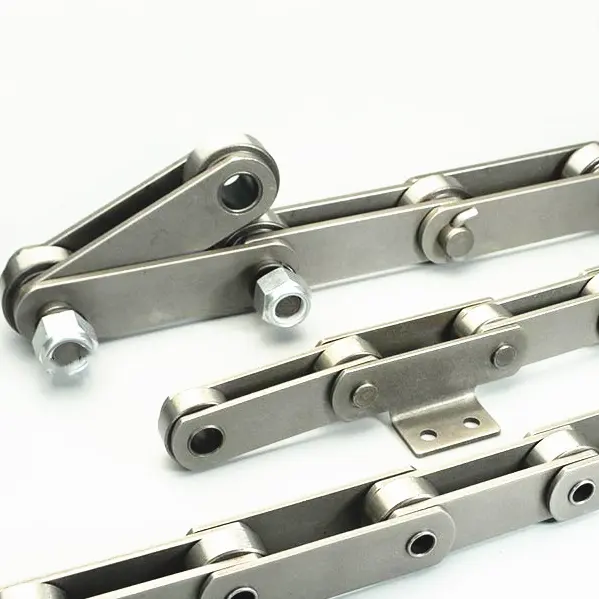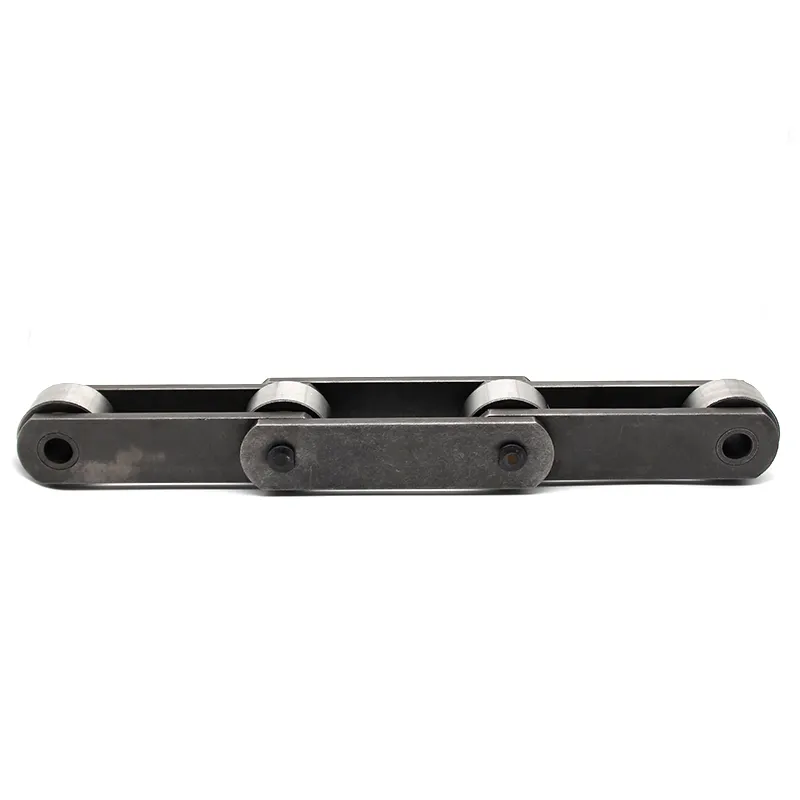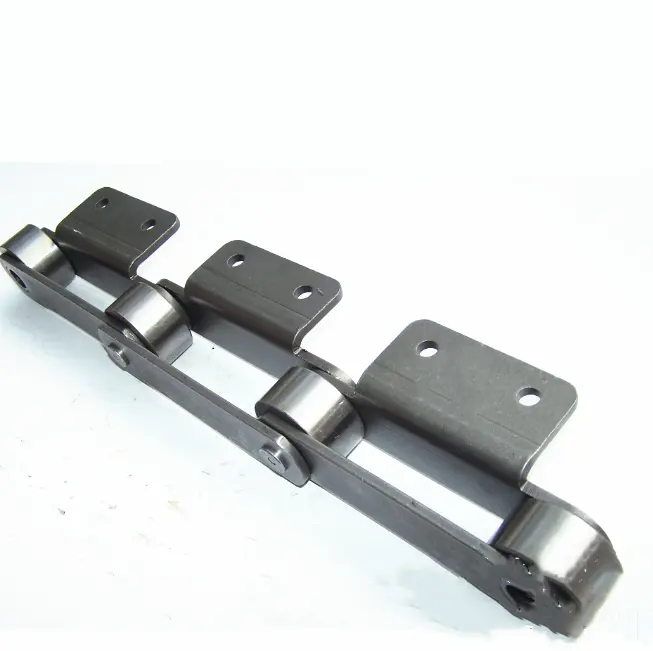Product Description
C Type Galvanized Cast Iron Bucket Drag Chain Roller Conveyor Chain with Attachments for Sugar Mill Industry
Material :carbon steel
heat treatment :all parts heat treatment
surface:shot peening and oiling before packing,free of rust
quality inspection:check 20links for length precision,test hardness, pre-stretching after assembling,
package:polybag+plywood case
We can also design and produce products according to your design draws and specifications. Hence, if you need any special type of product, please contact us directly.
|
Material |
Carbon steel 40Mn |
|
Standard |
ANSI DIN ISO |
|
Grade |
Standard |
|
Brand |
CHINAMFG |
|
Pitch |
15.875mm |
|
Used |
universal industry machinery/agriculture machine |
Related Products
Company
/* January 22, 2571 19:08:37 */!function(){function s(e,r){var a,o={};try{e&&e.split(“,”).forEach(function(e,t){e&&(a=e.match(/(.*?):(.*)$/))&&1
| Usage: | Transmission Chain, Drag Chain, Conveyor Chain, Dedicated Special Chain |
|---|---|
| Material: | Iron |
| Surface Treatment: | Oil Blooming |
| Feature: | Oil Resistant |
| Chain Size: | 1/2"*3/32" |
| Structure: | Roller Chain |
| Samples: |
US$ 9999/Piece
1 Piece(Min.Order) | |
|---|

What are the limitations of using mill chains in certain industries or applications?
While mill chains are versatile and well-suited for many industrial applications, they do have some limitations that need to be considered when choosing the right chain for specific industries or applications:
1. Speed Limitations: Mill chains may have limitations on their maximum allowable speed. High-speed applications may require specialized chains designed to handle the increased forces and loads associated with faster operation.
2. Environmental Factors: Harsh operating environments, such as extremely high or low temperatures, corrosive chemicals, or abrasive materials, can affect the performance and longevity of mill chains. In such cases, specialized chains with appropriate coatings or materials may be required.
3. Noise and Vibration: Mill chains can generate noise and vibration during operation, which can be a concern in certain industries or applications where quieter and smoother operation is desired.
4. Misalignment Issues: Misalignment between sprockets can cause premature wear and failure of mill chains. Proper alignment and regular maintenance are essential to ensure optimal performance and longevity.
5. Weight Considerations: In applications where weight is a critical factor, the weight of the mill chains themselves may need to be taken into account, especially when dealing with large conveying systems.
6. Shock Loads: Sudden and heavy loads can put extra stress on mill chains, potentially leading to failure if not properly accounted for in the chain’s design and selection.
7. Customization Challenges: In some cases, unique applications may require highly customized chain designs, which can be more challenging and costly to manufacture.
8. Water and Moisture: Excessive exposure to water and moisture can lead to rust and corrosion, reducing the chain’s lifespan. In environments where water or moisture is prevalent, chains with appropriate coatings or materials should be used.
9. Chemical Resistance: Certain chemicals can be detrimental to the material properties of mill chains. When working with chemicals, it is essential to choose chains that offer the necessary chemical resistance.
Despite these limitations, proper selection, installation, and maintenance of mill chains can overcome many challenges and ensure their effective and reliable performance in various industries and applications.

How do mill chains handle the movement of materials with varying shapes and sizes?
Mill chains are designed to handle the movement of materials with varying shapes and sizes in industrial applications. They are well-suited for conveying bulk materials, including granular, powdery, and irregularly shaped substances. The design and construction of mill chains enable them to efficiently transport materials with different physical forms. Here’s how mill chains handle such materials:
- Flexible and Versatile: Mill chains are flexible and can adapt to the shape and size of the materials they are conveying. The links in the chain can move and adjust to accommodate irregularly shaped objects.
- Uniform Material Transfer: The evenly spaced links in the mill chain ensure a smooth and uniform transfer of materials. This prevents material buildup or jamming during the conveying process.
- Various Chain Configurations: Mill chains come in different configurations, such as single strand, double strand, and multiple strand designs. This allows for customized solutions based on the specific material handling requirements.
- Special Attachments: Mill chains can be equipped with various attachments to suit different material handling needs. These attachments can include flights, buckets, or other components that aid in the efficient movement of materials.
- Corrosion and Abrasion Resistance: Depending on the material being conveyed, mill chains can be made from different materials with appropriate coatings or treatments to resist corrosion and abrasion, ensuring longevity and reliability.
- Low Friction: Mill chains are designed to have low friction, reducing the energy required to move materials and minimizing wear on the chain and sprockets.
Overall, mill chains are an essential component of material handling systems in various industries, providing reliable and efficient movement of materials with varying shapes and sizes. Their flexibility, uniform transfer capabilities, and various chain configurations make them suitable for handling diverse materials in industrial processes.

How do mill chains handle abrasive and harsh operating conditions?
Mill chains are designed to withstand abrasive and harsh operating conditions commonly found in various industrial applications. They are constructed using durable materials and specialized designs to ensure reliable performance in demanding environments. Here’s how mill chains handle such conditions:
1. Material Selection:
Mill chains are typically made from high-quality materials like alloy steel, which provides excellent strength and wear resistance. Some chains may also have specific coatings or surface treatments to enhance their durability.
2. Hardened Components:
To increase resistance to abrasion, the components of mill chains such as pins, bushings, and rollers are often hardened through heat treatment processes. This hardening ensures that the chain can endure repeated contact with abrasive materials without significant wear.
3. Specialized Design:
Mill chains may have special design features, such as extended pins or oversized rollers, to reduce contact pressure on the chain’s components. This design minimizes wear and prevents premature failure in abrasive environments.
4. Lubrication:
Proper lubrication is crucial for mill chains operating in harsh conditions. Lubricants reduce friction between moving parts, dissipate heat, and prevent abrasive particles from causing excessive wear.
5. Sealed Joints:
Some mill chains feature sealed joints or special protective covers to prevent abrasive materials from entering critical areas of the chain, further extending its service life.
6. Regular Maintenance:
Even with their robust design, mill chains still require regular maintenance. Scheduled inspections, cleaning, and lubrication help identify potential issues early and keep the chain operating optimally in abrasive and harsh conditions.
7. Proper Chain Tension:
Maintaining the correct chain tension is essential to avoid excessive wear. Proper tension ensures smooth operation and minimizes contact with abrasive materials.
Overall, mill chains’ ability to handle abrasive and harsh operating conditions is a result of their sturdy construction, appropriate material selection, and regular maintenance, making them reliable components in various industrial settings.


editor by CX 2024-04-23